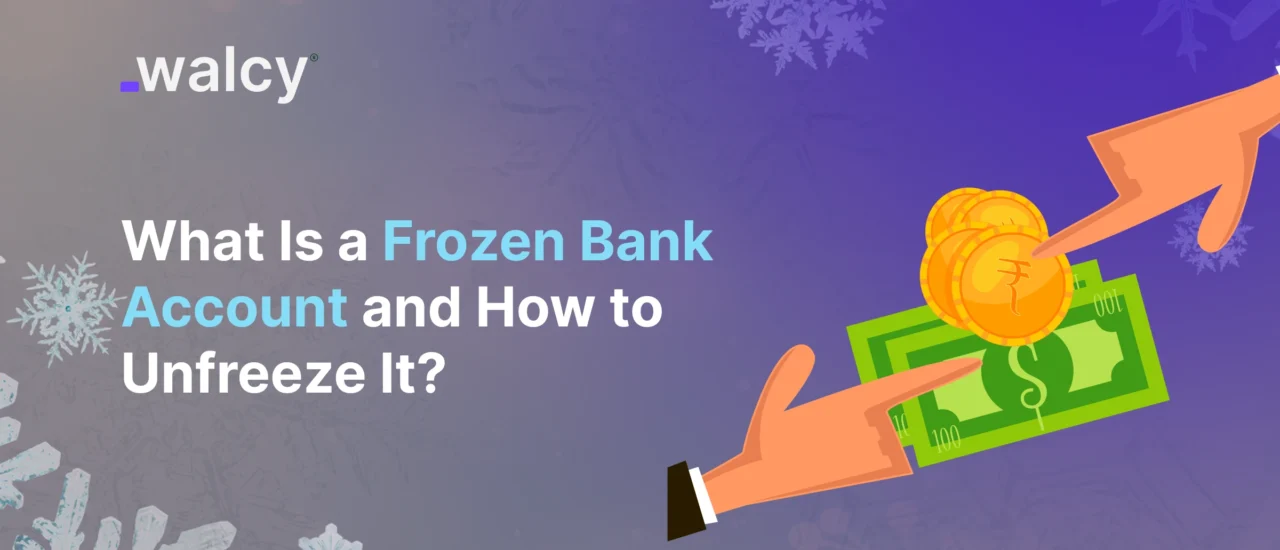Having a bank account freeze is frustrating, as anyone wanting to access some money will find it difficult. This guide will explain what a frozen bank account is, the many reasons why a bank can make such freezing of your account, the rules that surround account freezing, and most importantly how to unfreeze a frozen bank account.
What Is a Frozen Bank Account?
A frozen account is a situation in finance when the account holder does not have access to his or her money, and cannot perform any transaction related to withdrawal, transfer, or even any kind of payment. The bank then puts a restriction on the account and simply locks it. You would still be allowed to deposit your money in such a case, but until the issue that caused the freeze is resolved you are not allowed to access or withdraw your money.
Said less critically, the account remains open and intact but is just temporarily inaccessible. A bank freeze can be placed on an individual’s account shared accounts as well as business accounts.
Common Reasons for Bank Account Freeze
Before understanding how to unfreeze a frozen bank account, it is necessary to understand why banks freeze bank accounts. There could be several reasons as to why banks may freeze bank accounts, and these causes are best understood to avoid facing the problem in the very first place. The most common reasons include:
- Suspicious Activity:
Of course, under the guidelines of AML, banks have to go through accounts to find suspicious or other sorts of unusual activities. In case the bank suspects that your account is running illegal operations like money laundering or fraud, then it will most likely freeze your account.
- Court Orders or Legal Proceedings:
This can be made to force a bank to freeze your account by a court order, especially if one is a party in a lawsuit, bankruptcy, or lien. In case one’s debts become due, then creditors can get a court order for the freezing of your account and directly garnish funds owed to them.
- Tax Liens Governments
Ideal in the United States-IRS can put a lien on your account for taxes owed. All this means is that your account can be frozen until you get your case resolved with the government.
- Back Child Support
If you have back child support, the governmental agencies can come in and have an account frozen until the debt is paid. A child support agency may ask a court to freeze your bank account to collect overdue support.
- Identity theft or fraud:
If the bank suspects that your account has been compromised or stolen, it freezes the account from any kind of transaction until the matter is investigated and dealt with.
- Overdrawn Account or Negative Balance:
Overdrafts that are outstanding, and also some debts owed to the bank, from certain banks one’s account is frozen. Such accounts are only released when the amount owed has been paid.
- Loan/Debt Defaults:
If one defaults on the payment of their loans or any other type of debt, the creditor can get a judgment that freezes your account. The creditor can then get the account garnished to return the due debt.
Read about: International Payment Fraud: Ultimate Guide For Businesses.
Rules on Bank Account Freezing
Several regulations put a limit on when and how banks can freeze your account. Knowing such regulations will keep you abreast of your rights and how to go about it, should your bank account be frozen? Let’s delve into some general guidelines under the rules for bank account freeze.
- Notification:
Most banks are supposed to notify account holders once an account has been frozen. This may be through a letter, email, or even a phone call, depending on how the institution affects such communication. The notification often illustrates the reason why your account has been frozen and what steps you need to take to get yourself out of such a situation.
- Length of Freeze
some of the reasons for the freeze of bank accounts take longer as compared to others. For instance, anytime the account is frozen due to a court order, it will last until the case is concluded. If this account was frozen due to suspicious activities, it will remain frozen until the bank has concluded its investigation.
- Access to Information:
Even though the actual withdrawal of cash will not be allowed, this should not restrict one from accessing the account statement, transaction history, and balance information. That way, you still remain informed about what goes on with your account during this freezing period.
- Deposit Functionality:
In the case of a frozen account, you are most of the time allowed to deposit money into your account during such conditions; however, one cannot access this money until the freeze is lifted.
- Debt Repayment:
In cases where the courts make a specific requirement for debt repayment or garnishment, some of the money in the account could be allowed to be removed to satisfy the debt. The bank will notify you of the amount deducted toward settling the debt.
- Account Holder Rights
You are entitled to oppose the freeze if you feel that it is uncalled for. Regarding illegal freeze, you may take the matter further to a higher level such as financial ombudsman or to court.
How to Unfreeze a Frozen Bank Account
If your bank has frozen your account, you would want to take immediate steps to get it unfrozen. Follow the next steps, trying to solve this issue as soon as possible:
- Contact the Bank
The first thing you should do to try to unfreeze your account is to call the bank’s customer service number. The bank should be in a position to inform you why the account was frozen and give you steps regarding how to sort out the matter. Be prepared to identify yourself, and whatever documentation may be required. Sometimes this may be all because of some simple misunderstanding or clerical error on the part of the bank, which can immediately be ironed out.
- Resolve Outstanding Legal Issues
If the freeze is regarding a court order, tax lien, lawsuit, or child support, then you would need to go about resolving the underlying legal issue. That may involve paying your debt, negotiating some sort of time to pay, or coming to some sort of arrangement with your creditor or governmental agency. You can then provide your bank with proof of settlement once the matter is settled. The bank will subsequently file the papers needed to lift the freeze.
- Collateral Documents
The Bank may ask you to provide certain documents proving that your account has not been compromised. It could be in the form of furnishing a copy of recent transactions explaining the source of funds or providing identity in the form of Biometrics to prove that this is you. It would review the case upon receiving all the documents and unfreeze the account if everything is okay.
- Consult with Legal Counsel
If you have a complicated legal issue or believe that your account has been frozen for unfounded reasons, then it may be advisable to consult with an attorney. A financial law attorney can take you through the process and can help you dispute the freeze if need be.
- Debt Settlement
When an account is frozen due to debt, overdraft, or loan, making due payments usually solves the problem in such cases, and the account gets unfrozen. Ensure that the bank has received the payment and completed all the formalities for un-freezing.
- Tax Liens and Government Holds
In cases where the freeze arises due to unpaid taxes, you have to pay your tax bill to the agency concerned. This may involve allowing them to work out a payment plan; when that is settled, the freeze gets removed. Provide your bank with proof of payment or the payment plan as the means to commence the unfreezing process.
- If the freeze is because of an investigation of suspicious activity conducted by the bank, then it is best to wait until the investigation concludes. This may take a long and could be highly irritating, but most of the legal and regulatory procedures followed by the bank are for the protection of your account.
Read about: All About Overseas Payments (2024); Comprehensive Guide
No Freezing in the Future
The following precautions can be taken to avoid any such freeze of your bank account in the future:
- Keep a Regular Eye on Your Account:
It’s good to go through your account statements and transaction history from time to time to see if there is any suspicious or unauthorized activity. Being at the forefront will ensure that you find issues that may freeze before they do.
- Pay Bills, Taxes, and Debts in Good Time:
One should pay his bills, taxes, and debts without delays as court orders against one or liens from the government will lead to deductions on his account. In case this happens, and one finds it hard to pay his debt, he should call creditors and discuss a payment plan with them.
- Keep Records of Large Transactions/Big Deposits:
Keep records of large transactions or big deposits for a while for any possible need to present to the bank. This can be most helpful, especially when the bank flags your account due to suspicion.
- Inform Your Bank:
If you are going to do a large transaction or will receive an out-of-the-usual deposit, then let your bank know ahead of time. In that way, this may save the bank from flagging the transaction suspicious and freezing your account.
- Resolve Conflicts as Soon as Possible:
In the event of lawsuits or disputes that could result in a court order against you, you need to resolve the conflict as soon as possible to keep it from affecting the status of your account.
Conclusion
Having a frozen bank account is quite a big hassle. Knowing for what reason that freeze has taken place, plus some bank account freeze rules, it will be pretty easy to fix in no time. This step-by-step guide will help one take the right steps towards unfreezing his or her frozen bank account and having access to the money.
Prevention is always better than treatment; hence, proactive steps taken by monitoring your account, paying debts on time, and good communication with the bank will keep your account continually accessible.
Do follow us on Facebook and LinkedIn, to stay connected with us.



